Compressive Strength
Compressive Strength
Compressive strength or the capacity of the material to resist compressive loading applied across both major surfaces of a plate for example, is one of the key strengths of an advanced ceramic. The application of a load spread evenly over these surfaces is one of the key measures used to gauge its capability to resist compaction. The exact opposite test criteria is tensile strength where the material is tested by being pulled apart, with forces applied to surfaces 180 degrees opposed to each other.
The structure of the material, the process of compaction and even machining / diamond grinding also has an effect on the strength of the material.
Reduce the flaw size and the number of flaws and the material strength will improve, a better engineered material with smaller grain sizes performs much better than a material with large grains in this test, and improved surface finish can also be a benefit.
Compressive strength or the capacity of the material to resist compressive loading applied across both major surfaces of a plate for example, is one of the key strengths of an advanced ceramic. The application of a load spread evenly over these surfaces is one of the key measures used to gauge its capability to resist compaction. The exact opposite test criteria is tensile strength where the material is tested by being pulled apart, with forces applied to surfaces 180 degrees opposed to each other.
The structure of the material, the process of compaction and even machining / diamond grinding also has an effect on the strength of the material.
Reduce the flaw size and the number of flaws and the material strength will improve, a better engineered material with smaller grain sizes performs much better than a material with large grains in this test, and improved surface finish can also be a benefit.

Materials Ranked by Compressive Strength
CeramAlox™ Ultra Pure’s compressive strength performance characteristics are the highest compared to all other materials. This is closely followed by Zirconia Toughened Alumina, Silicon Carbide, and Silicon Nitride and others.
CeramAlox™ Ultra Pure’s compressive strength performance characteristics are the highest compared to all other materials. This is closely followed by Zirconia Toughened Alumina, Silicon Carbide, and Silicon Nitride and others.

Alumina (Al2O3) – CeramAlox™ Ultra Pure
3500 MPa
CeramaAlox Ultra Pure is a very high purity (99.95%) grade of Alumina (Aluminum Oxide) often used in the medical industry for it’s compressive strength and purity

Zirconia (ZrO2) - CeramaZirc™ Nano HIP
3000 MPa
A hipped material made using nano grade powder, Zirconia offers high strength, wear resistance, and flexibility far beyond those of most other advanced ceramics.

Silicon Nitride (Si3N4) – CeramaSil-N™ PCSN2000
3000 MPa
Silicon Nitride has the most versatile combination of mechanical, thermal, and electrical properties of any advanced ceramic material.

Aluminum Nitride (AlN) – CeramAlum™
2,000 MPa
Aluminum Nitride (AlN) is an excellent material to use if high thermal conductivity and electrical insulation properties are required; making it an ideal material for use in thermal management and electrical applications.
Related Properties

Fracture Toughness
The ability to resist fracture is a mechanical property of materials known as fracture toughness. For advanced ceramics it uses a critical stress intensity factor known as KIC where the fracture normally occurs at the crack terminations.

Density
Density is the mass of a material per unit volume. The unit of measurement can be expressed in different ways and is referred us as g/cm3 but another measurement value is kg/m3.

Hardness
One of the most valuable characteristics of advanced ceramics in high-performance applications is their extreme hardness. Hard ceramic materials are used for a wide range of applications in diverse fields and applications such as cutting tools for milling and grinding.
